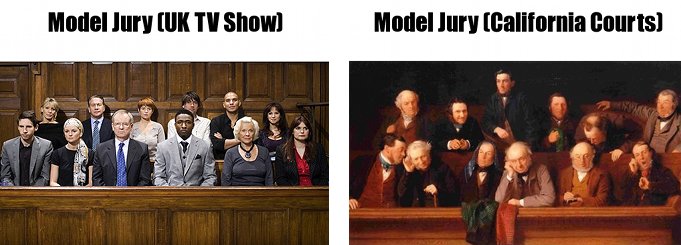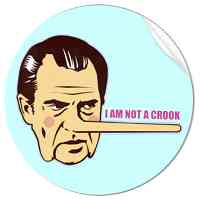Update of 2009-10-26 SF Bayview post

The Ninth Circuit U.S. Court of Appeals has slammed the door on California's attempt to maintain covert racial bias in jury selection: it refused to reconsider its prior ruling that overturned a murder conviction obtained by San Mateo County Chief Deputy District Attorney Steve Wagstaffe. In an unusually sharp rebuke, the Court pointed to “overwhelming evidence indicating that the prosecutor [Wagstaffe]...acted with discriminatory intent when he struck M.C. [an African-American juror]”. It called Wagstaffe's justifications “pretexts”, “make-weight” and “logically implausible”, while asserting that the ruling of the lower courts in favor of Wagstaffe “was not only incorrect, but unreasonable”. 1
Not racial, just anti-smart-ass
Wagstaffe claimed to have feared that a past attempted molestation of M.C.'s daughter could affect M.C.’s impartiality. But the Ninth Circuit replied that “any bias on M.C.’s part logically would favor the prosecution, not the defense”, since her sympathies would be with the victim of domestic violence. In fact, the record showed Wagstaffe favored jurors who had been the victims of domestic abuse. His two other reasons for excluding M.C. were similarly shot down. He also struck the only other African-American juror, a software designer, claiming he might “over-intellectualize”, and that he gave a “smart-ass” (yes, that's the term Wagstaffe gave the court) answer to one of his questions – a classic profile of the despised uppity negro with an attitude.
Yet Wagstaffe remains fully supported, by both the county and state, as a top prosecutor and political candidate. And the press reports of the Ninth Circuit's initial ruling made scant mention of his racially-biased jury rigging (his name was not even mentioned in the LA Times or UPI reports even though, in an unusual move, the ruling actually identified Wagstaffe by name), while the Court's refusal to review the case seems to have gone completely unreported.
While much mainstream attention goes to racially discriminatory policing (so-called “racial profiling”), and activists have focused on the weakness of current police accountability, the racially discriminatory practices of prosecutors and their near-absolute autonomy have largely slipped under the radar. Yet, while police have wide discretion in making arrests, prosecutors have complete discretion – with no oversight - in deciding if an arrested person is actually charged with a crime. Consequently, as Angela J. Davis has long argued, to tackle racial disparities in the US criminal justice system we must recognize that “one of the most significant contributing factors is the exercise of prosecutorial discretion”. 2
Thus when a high court rules that one of the state's respected prosecutors acted with racially discriminatory intent in removing jurors, alarm bells should go off for any Californian who wants to see the state's criminal justice system become less criminal, and more just.
Both Steve Wagstaffe and Berkeley appellate attorney A.J. Kutchins kindly agreed to discuss the ruling for SF Bayview readers (Deputy Attorney General Michele Swanson, who represented the state in the appeal, did not return calls seeking comment). In addition, Golden Gate University Professor of Law Peter Keane, respected legal analyst and former SF Chief Assistant Public Defender, provided another perspective on the ruling.
Racial Jury Rigging Goes Stealth
Wagstaffe may have lost by his fouls,
but from all accounts (including his own) the loss was a stinging
smackdown. It snatched his victory by reversing a high-profile murder
conviction (the victim was the daughter of an NFL star) by the
high-profile prosecutor (every weekday Wagstaffe e-mails updates to
the press
3
) when he is poised to become the DA. And it smacked him
in a politician's sensitive area: rigging juries by excluding
African-American jurors could be career-limiting in a society
declared “post-racial” . Wagstaffe responded to this blow to his
“gut feeling”:
This was a disappointment to me.
I have to accept it, but I don't agree. I feel very personally
maligned by it. I now have a greater sympathy for people who have
been falsely accused. Of course, I don’t compare myself with
someone who has been incarcerated. There’s been no loss of
liberty.
In fact, other than loss of face on being "outed", there appears to be no actual loss of anything for Wagstaffe, who has now gone on to a death-penalty case. Of course, the appellate ruling was not personal – it was about the business of giving California courts a stiff shove into the 21st century.
Kutchins observed:
For the last two decades, California courts have had a shameful history of countenancing racial discrimination in jury selection and have been continually rebuked by the federal courts.Keane agrees:
Racial discrimination in jury selection was first prohibited in 1880, yet this state still has not caught up.
In fact, although the right to a trial by a fair and impartial jury is guaranteed by the 6th Amendment to the US Constitution, the struggle to eliminate racial discrimination in jury selection has looked less like a progressive march forward, and more like judicial Whac-A-Mole – bursts of court rulings hammering at new forms of bias that keep popping up.
 In 1880, the Supreme Court hammered at jury pools that are not representative of the community, when it invalidated a West Virginia
statute that declared that African-American citizens could not serve as jurors. Subsequently, discrimination just became more subtle,
as laws that explicitly excluded African-Americans were replaced by laws that were used to effectively exclude. During jury selection,
a juror can be excluded by a “challenge for cause”, that requires convincing a judge that the juror cannot be impartial. But the more
permissive “peremptory challenge” allows attorneys to exclude jurors without explanation – thus providing another hole for bias to pop up.
As a Tufts University study points out: “Peremptory challenges are often based on 'gut feelings'...it is well-documented that attorneys
systematically consider categories such as gender, occupation, and nation of origin in their efforts to eliminate jurors they believe to be
unfavorable to their clients..."
4
In 1880, the Supreme Court hammered at jury pools that are not representative of the community, when it invalidated a West Virginia
statute that declared that African-American citizens could not serve as jurors. Subsequently, discrimination just became more subtle,
as laws that explicitly excluded African-Americans were replaced by laws that were used to effectively exclude. During jury selection,
a juror can be excluded by a “challenge for cause”, that requires convincing a judge that the juror cannot be impartial. But the more
permissive “peremptory challenge” allows attorneys to exclude jurors without explanation – thus providing another hole for bias to pop up.
As a Tufts University study points out: “Peremptory challenges are often based on 'gut feelings'...it is well-documented that attorneys
systematically consider categories such as gender, occupation, and nation of origin in their efforts to eliminate jurors they believe to be
unfavorable to their clients..."
4
In Batson v. Kentucky (1986) the Supreme Court, recognizing that peremptory use for racial discrimination violated the constitutional right to equal protection, ruled that jurors could not be removed solely on the basis of race 5 (In these cynical days, where protesting racial discrimination has become known as “playing the race card”, it is important to note that these equal protection rulings have been upheld as protection for all. Restrictions in peremptory use were later extended to gender. 6 Not only has protection been extended from race to both gender categories - courts have ruled that excluding women from the jury of a male defendant denies due process 7 - courts have also ruled that a European-American male was denied a fair trial when African-Americans were excluded from his jury. 8 The Court's logic was simple and clear: systematically excluding any segment of the community during jury selection casts doubt on the integrity of the entire trial process.)
Kutchins summarized the post-Batson rules:
In the legal field, there is a common saying on juror elimination: 'You can do it for any reason, or no reason. You just can't do it for a bad reason'.”Given the long history of unrestricted use of peremptory to racially scrub the jury panel, the effect of Batson was not difficult to predict: racial rigging was recast in race-neutral justifications. Regarding today's California courts, Kutchins tells us:
It is an everyday practice for prosecutors to eliminate African-Americans in jury cases, simply because they are African-Americans. The Ninth Circuit only publishes a fraction of its opinions. This is the second opinion published in the last year on racial discrimination[the other was an Alameda county case, for which Kutchins was also counsel: Green v Lamarque] 9
For ten years, with increasing frequency, the fed court has published opinions rebuking the state for failing to rule against racial discrimination in juror selection. The great majority of these cases involve prosecutors eliminating on the basis of race. The court is clearly trying to send a message...As a result, prosecutors are getting more sophisticated. This may sound cynical, but prosecutors are just getting more sophisticated about justifying juror elimination. And trial judges (who may be colleagues of the prosecutor) merely rubber-stamp the justifications given.
Indeed, prosecutors' juror challenges now can be backed by
professional jury consultants, statistics, and software.
10
Still, to see California prosecutors' unprocessed racism one need look no
further back than an appeal of a 1992 conviction, where Deputy
District Attorney Worth Dikeman (formerly in Humboldt County, now in
El Dorado County) justified striking three
Native American women and one Asian woman from the jury, to obtain an
all-white jury. No one could accuse Dikeman of masking bias with
sophisticated justifications:
Ms. Rindels was the one darker skinned female...that I challenged. My
experience is that [N]ative Americans who are employed by the tribe
are a little more prone to associate themselves with the culture and
beliefs of the tribe than they are with the mainstream system, and my
experience is that they are sometimes resistive of the criminal
justice system generally and somewhat suspicious of the system...
...child molesting is okay in certain [N]ative American cultures...and there are a whole bunch of people that violate our laws
that are [N]ative Americans and they go much more often through the [N]ative American system than the criminal system...
11
Dikeman saw nothing wrong with his justifications:
It is wrong to systematically exclude groups from the jury pool. I don’t do it. I haven’t done it and I will never do it.
Dikeman's stereotyping was accepted as non-racial justifications by the trial judge, the California Court of Appeal,
the federal district court and a normal Ninth Circuit review. Finally, the full Ninth Circuit rejected the
justifications in 2006, noting: “The racial animus behind the prosecutor’s strikes is clear”.
But it only became “clear” 14 years after the discrimination claim was raised.
Just Another Whack?
So what is the significance of this latest whack at racial bias in jury selection? Certainly, cases of those serving time for serious
convictions by Wagstaffe (or any prosecutor in the San Mateo DA office that he dominates) should be reviewed. But will it really change
jury selection in this state? Probably not for Wagstaffe since he, like Dikeman, denies that he did anything wrong:
I know in my heart that I did not do what they allege. I have practiced and lectured in this office for 32 years on how you
cannot do this...But from this I’ve learned to keep detailed and extensive notes, so I will
put on record, why I selected or dismissed each prospective juror.
Or, as Philadelphia's Jack McMahon said in his infamous 1986 training video, that teaches prosecutors how to lie to judges and exclude
African-Americans from juries:
You're not going to be able to go back and make something up about why you did it. Write it down, right then and there!
12
Track your bogus race-neutral justifications carefully!

But Keane sees more clout in this hit:
Very significant . It will have an effect in the local area, where district attorneys in particular have flouted prohibitions against using racial discrimination in jury selection - and getting away with it as long as the DA came up with a half-hearted story. This is long past due. Rulings in the past have been more oblique. This was direct - no ifs, ands or buts. It closes cracks in the door...
You have to sort out what prosecutors say for public consumption. They are political animals - they have to run for public office. So they are unlikely to publicly concede fault in their past and current practices. But they are not impractical. They realize that they run a big risk of reversal of significant cases.
While they may publicly vow to appeal to the Supreme Court, they must look at their likelihood of success. The number of cases taken by the Supreme Court is shrinking – it's likely that the Court would not review it. And if they did, it's likely that they would uphold the Ninth Circuit decision, as it is consistent with past rulings. In the long run, state prosecutors are going to conclude: 'We have to stop getting away with this stuff'.
While Kutchins agrees that California prosecutors are unlikely to get relief from the Supreme Court, he has no illusions about the compliance of California courts:
Until a few years ago, California courts were refusing to strictly apply Batson, interpreting it as not requiring comparative juror analysis: 'All we need to do is decide if his reasons are race-neutral.' The Federal court response was: 'No, you need to find out if he is discriminating. To do that you need to do comparative juror analysis. [In this ruling] The Ninth Circuit said California courts did not do what they need to do.The methdod of “comparative juror analysis” simply corresponds to the common test for determining fairness: is everyone treated the same? Specifically, if each of a prosecutor’s non-racial reasons for striking a minority juror is clearly and convincingly refuted, because they were not applied to otherwise similar non-minorities who were permitted to serve, then the court must conclude that the actual and only reason for striking the juror was race. This is the test that California courts have failed to apply. Kutchins explains:
California courts give up just as much as they feel they need to give up. With each decision handed down by the Federal courts, California has responded: 'We have to do X, but we interpret this as we don't have to do Y'. California courts can fight it, but the Supreme Court has been good in this area.
Ultimately I believe, as Thurgood Marshall wrote, the problem comes down to the peremptory itself.
In ruling on Batson, Supreme Court Justice Thurgood Marshall correctly foresaw the inherent difficulties when he wrote:
The decision today will not end the racial discrimination that peremptories inject into the jury-selection process. That goal can be accomplished only by eliminating peremptory challenges entirely... Prosecutors are left free to discriminate against blacks in jury selection provided that they hold that discrimination to an 'acceptable' level...A prosecutor's own conscious or unconscious racism may lead him easily to the conclusion that a prospective black juror is 'sullen,' or 'distant,' a characterization that would not have come to his mind if a white juror had acted identically. A judge's own conscious or unconscious racism may lead him to accept such an explanation as well supported...Even if all parties approach the Court's mandate with the best of conscious intentions, that mandate requires them to confront and overcome their own racism on all levels - a challenge I doubt all of them can meet...The inherent potential of peremptory challenges to distort the jury process by permitting the exclusion of jurors on racial grounds should ideally lead the Court to ban them entirely from the criminal justice system...
That won't happen in a Wagstaffe world – he declared:
I’m one of those old-time dinosaur prosecutors that don’t want to give
up peremptory challenges, to keep out stealth jurors. [i.e., jurors
with a hidden agenda]
For cases with little chance of reaching federal appeal this ruling need not trouble Wagstaffe, as he can continue to rely on district and state judges to rubber-stamp his most dubious claims. As history repeatedly shows us, effective change will not come from the grace of the rulers, but from the forces of opposition letting those “old-time dinosaur prosecutors” know that it's time to pick up their pensions and move on.
- ALI V HICKMAN , 7 July 2009, Ninth Circuit Court of Appeals ↩
- Angela J. Davis, "Racial Fairness in the Criminal Justice System: The Role of the Prosecutor" , Fall 2007, Columbia Human Rights Law Review ↩
- The Wagstaffe Chronicles , 7 April 2008, Cal Law blog ↩
- "Bias in Jury Selection: Justifying Prohibited Peremptory Challenges" , 2007, Journal of Behavioral Decision Making ↩
- BATSON v. KENTUCKY , 30 April 1986, U.S. Supreme Court ↩
- J. E. B. v. ALABAMA , 19 April 1994, U.S. Supreme Court ↩
- TAYLOR V. LOUISIANA , 21 January 1975, U.S. Supreme Court ↩
- CAMPBELL v. LOUISIANA , 21 April 1998, U.S. Supreme Court ↩
- GREEN v. LAMARQUE , 4 August 2008, Ninth Circuit Court of Appeals ↩
- "Jury-Rigging: Can a computer pick a better jury than a high-priced consultant?" , 10 August 2006, Slate ↩
- KESSER v. CAMBRA , 11 September 2006, Ninth Circuit Court of Appeals ↩
-
"Former Philadelphia Prosecutor Accused of Racial Bias"
, 3 April 1997, NY Times
"Jury Selection, with Jack McMahon", 1986, Office of Philadelphia District Attorney:
video: full, unedited (62 minutes)
video: excerpts (1 minute) ↩ - The Examiner , 2010, June 9 ↩
